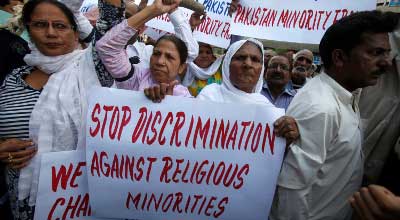Pakistani Woman Refuses Islam, Imprisoned for ‘Blasphemy’
A young mother has been falsely accused of “blaspheming” Muhammad, the prophet of Islam, because she rebuffed attempts by relatives who had converted to Islam to force her to renounce her Christian faith, family members said.
Police in Khichiwala, Bahawalnagar district, in Punjab Province, charged 26-year-old Shamim Bibi, mother of a 5-month-old girl and resident of the village Chak No. 170/7R Colony, in the Fort Abbas area, under Section 295-C of Pakistan’s “blasphemy” statutes after neighbors accused her of uttering remarks against Muhammad. She was arrested on Feb. 28.
Speaking ill of Muhammad in Pakistan is punishable by life imprisonment or death under Pakistan’s internationally condemned blasphemy laws.
The young woman’s brother, Ilyas Masih, and her brother-in-law, Shahbaz Masih, told Compass that she had been wrongly accused because she had resisted pressure to convert to Islam four days before her arrest.
“Nazeeran, sister of Shamim’s husband Bashir Masih, and her nephew Nadeem and niece Bella accepted Islam on Feb. 24 and called on her to do the same,” Masih said. “She refused, telling them that she was satisfied with Christianity and did not want to convert.”
He said the newly converted Muslims persisted in trying to force her to convert, but she resisted.
“Shamim told them that she had complete faith in a living God, and that there was no reason for her to start ‘worshipping graves,’” Masih said.
That remark was not the one deemed “blasphemous.” Rather, on Feb. 27 her neighbors accused her of making derogatory remarks—as yet unknown—on a separate occasion about Muhammad while in her courtyard.
Ansar Ali Shah, a local prayer leader in Chak 170/7R Colony, claimed that Shamim Bibi’s neighbors, Hamad Ahmed Hashmi and Abdul Qayyum, told him and other Muslims that they had heard the Christian woman making derogatory remarks about Muhammad in her courtyard, according to the First Information Report (FIR No. 30/12) registered by the Khichiwala police station. But there is no indication in the FIR of what, exactly, Shamim Bibi was alleged to have said.
As word of the allegation spread, a large crowd of villagers besieged her house and demanded “severe punishment for the infidel,” claiming she had hurt their religious sentiments, sources said.
Shahbaz Masih, her brother-in-law, told Compass that Qayyum, one of the two men named in the FIR as witnesses, has denied hearing anything from Shamim Bibi that supports the charge.
“Qayyum told police that he wasn’t even present in his house at the time of the alleged incident and had come to know about it from Hamad, the other witness,” Shahbaz Masih said.
Hamad Ahmed Hashmi, a motorized-rickshaw driver, also was not present at his house at 3 p.m., the time of the alleged remark, Shahbaz Masih said, based on information gathered from Shamim Bibi’s neighborhood.
“Hamad transports schoolchildren and could not have been in his house at the time of the incident, as it was just after school closing hours,” he said.
Bahawalnagar Superintendent of Police Investigation Irfan Ullah acknowledged that one of the two witnesses had admitted to not being present at the alleged “crime” scene at the time of the alleged remark.
“Qayyum told us that he hadn’t witnessed the incident and his name had been included in the FIR by the locals, but still that does not prove that Shamim did not commit blasphemy,” Ullah told Compass by phone. “The other witness is standing by his claim, and she has produced nothing so far which can prove her innocence.”
He vehemently denied that police had caved in to pressure from local Muslims and had registered a case in undue haste.
“I visited the village twice, and so far nothing has come up that suggests that the people have accused Shamim wrongly,” Ullah said. “We registered a case against her on the directions of the district police officer.”
Bahawalnagar District Police Officer Salman Ali Khan could not be reached for comment.
Shamim Bibi’s family and her infant daughter, meantime, may have to wait for a long time for her return. While no one has been executed for blasphemy in Pakistan, most are freed on appeal after suffering for years under appalling prison conditions.
Vigilantes have killed at least 10 people accused of blasphemy, rights groups estimate.
Section 295-C of Pakistan’s blasphemy law states: “Whoever by words, either spoken or written or by visible representation, or by any imputation, innuendo or insinuation, directly or indirectly, defiles the sacred name of the Holy Prophet Muhammad (PBUH) shall be punished with death, or imprisonment for life, and shall also be liable to fine.”




























































